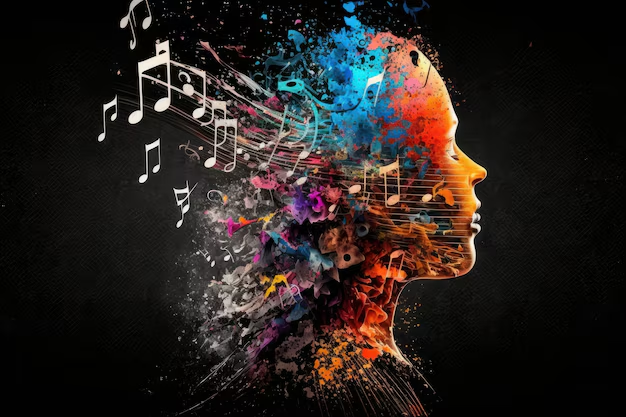Ours is the harmonic mind, which is why music profoundly impacts it. It influences everything from our moods to our cognitive abilities.
The melodies that fill our lives, from the subtle background tunes at coffee shops to the influential scores in blockbuster movies, do more than entertain us.
This exploration into the effects of music on the brain showcases its power to alter neurochemistry, regulate emotions, enhance cognitive performance, reduce stress, and even provide therapeutic benefits.
With a harmonious blend of art and science, music emerges as a subtle force shaping our mental health and daily experiences.
Effects of Music on Brain Neurochemistry
One of the most fascinating aspects of music is its ability to affect brain neurochemistry. The harmonious relationship between music and the brain has captivated scientists and musicians for decades.
As a universal language, music can profoundly influence our emotions, enhance our moods, and even alter our brain’s neurochemistry.
Recent studies delve into how melodies and rhythms can significantly impact the level of various neurotransmitters, such as dopamine and serotonin, which play a crucial role in our overall well-being.
This exploration into the neurochemical effects of music unveils its potential therapeutic uses, highlighting its importance not just as a form of entertainment but as a facilitator of profound psychological and physiological changes.
Dopamine, often referred to as the ‘feel-good’ neurotransmitter, is closely associated with the pleasure and reward centers of the brain.
Research has demonstrated that listening to music can dramatically increase dopamine levels, offering enjoyment and euphoria.
This surge contributes to the joy we derive from musical experiences and underscores music’s capacity to enhance our motivation and alleviate feelings of depression.
This impact of music on dopamine levels thus presents a compelling case for its use in improving mental health and well-being.
Emotional regulation, a key to mental well-being, is significantly influenced by the type of Music one listens to.
Listening to music can provide an escape valve for emotions, allowing individuals to express their feelings more deeply. Whether through the cathartic power of a sorrowful ballad or the uplifting energy of an upbeat score, music offers a unique means of managing emotions, making it an invaluable tool for emotional wellness.
Music’s Influence on Cognitive Performance
The intricate relationship between music and cognitive performance has intrigued scientists and musicians for centuries.
Music is a universal language that evokes emotions, triggers memories, and enhances intellectual functions.
Recent studies have delved deep into understanding how melodies and rhythms influence the human brain, shedding light on music’s potential to boost cognitive abilities, improve memory, and aid learning and concentration.
This exploration highlights auditory mechanisms and brain activation prompted by music.
It examines the type of music that yields the most significant cognitive benefits, ultimately suggesting the integration of music therapy into cognitive rehabilitation techniques.
Listening to music initiates complex brain activities involving various regions responsible for processing sounds, emotions, and memories.
Neuroimaging studies reveal that music triggers a symphony of neuronal firings across the brain, engaging areas like the auditory cortex, hippocampus, and even amygdala.
Type of music and their cognitive effects
Classical Music, often associated with the Mozart Effect’, is believed to enhance mental alertness and memory.
Jazz can stimulate creativity, encouraging novel neural connections that are meaningful for problem-solving.
Pop music may improve mood and motivation, facilitating better focus and endurance during tasks.
Ambient music, with its minimalistic structure, supports concentration by reducing distractions.
Roles of Music in Stress Reduction
In today’s fast-paced world, stress reduction is more important than ever, and music offers a readily accessible remedy.
Extant research has shown that music has a soothing and lowering effect on the cortisol levels of the body’s stress hormone, facilitating relaxation and a sense of calm.
Music versatility allows it to transcend cultural and personal preferences, offering unique stress relief across various genres.
The repetitive beats of electronic music or the soulful melodies of blues can induce a meditative state, helping listeners to detach from their stressors.
This diversity ensures that everyone can find a musical genre that resonates with their needs for stress reduction.
Research into the interplay between music and the mind offers fascinating insights into why music is an effective stress- -reliever.
Music has also emerged as a powerful modality in healthcare, recognized for its effectiveness in reducing stress and anxiety among patients with various medical conditions.
By incorporating music into therapeutic practices, healthcare professionals can facilitate communication, expression, and social interaction among patients, enhancing their overall well-being.
https://www.jstor.org/stable/40390679
Personal anecdotes from patients who have experienced the transformative power of music in their recovery journey underscore its potential as a complement to traditional treatment and as a form of therapy.
Music Therapy and Mental Health
The intersection of music and therapy offers a unique avenue for addressing mental health issues. Music therapy harnesses the innate power of melodies and rhythms to foster healing and well-being.
The concept of music therapy has gained substantial traction in contemporary therapeutic practice, while its application is historical.
Music therapy offers a myriad of benefits for individuals grappling with mental health challenges.
It serves as a conduit for emotional expression, providing an outlet for feelings that may be difficult to articulate through words alone.
Beyond its expressive capabilities, music therapy can induce relaxation and reduce anxiety and also depression.
Musical therapists play a pivotal role in the delivery of music therapy.
These trained professionals are skilled at assessing their clients’ emotional well-being, physical health, and communicative abilities and tailoring their therapeutic approach accordingly.
In conclusion, exploring music’s influence on mental well-being uncovers a complex but undeniably positive relationship.
Music offers an unparalleled resource for enhancing mental health by intertwining with our cognitive functions, emotional state, and neurochemical balances.
As research and personal testimonies continue to reveal, the harmonic remains one of humanity’s most profound expressions of the healing power of music.
